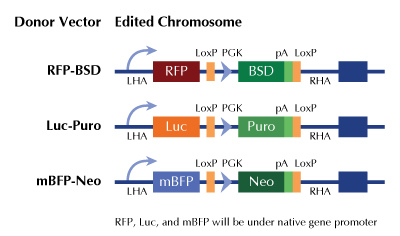MRE11 Human Gene Knockout Kit (CRISPR)
CAT#: KN209414RB
MRE11A - human gene knockout kit via CRISPR, HDR mediated
Functional Cassette: GFP-puro Luciferase-Puro mBFP-Neo
HDR-mediated knockout kit validation
USD 1,657.00
2 Weeks*
USD 450.00
USD 648.00
Specifications
| Product Data | |
| Format | 2 gRNA vectors, 1 RFP-BSD donor, 1 scramble control |
| Donor DNA | RFP-BSD |
| Symbol | MRE11 |
| Locus ID | 4361 |
| Components |
KN209414G1, MRE11 gRNA vector 1 in pCas-Guide CRISPR vector KN209414G2, MRE11 gRNA vector 2 in pCas-Guide CRISPR vector KN209414RBD, donor DNA containing left and right homologous arms and RFP-BSD functional cassette. GE100003, scramble sequence in pCas-Guide vector |
| Disclaimer | These products are manufactured and supplied by OriGene under license from ERS. The kit is designed based on the best knowledge of CRISPR technology. The system has been functionally validated for knocking-in the cassette downstream the native promoter. The efficiency of the knock-out varies due to the nature of the biology and the complexity of the experimental process. |
| Reference Data | |
| RefSeq | NM_005590, NM_005591, NM_001330347 |
| UniProt ID | P49959 |
| Synonyms | ATLD; HNGS1; MRE11; MRE11B |
| Summary | This gene encodes a nuclear protein involved in homologous recombination, telomere length maintenance, and DNA double-strand break repair. By itself, the protein has 3' to 5' exonuclease activity and endonuclease activity. The protein forms a complex with the RAD50 homolog; this complex is required for nonhomologous joining of DNA ends and possesses increased single-stranded DNA endonuclease and 3' to 5' exonuclease activities. In conjunction with a DNA ligase, this protein promotes the joining of noncomplementary ends in vitro using short homologies near the ends of the DNA fragments. This gene has a pseudogene on chromosome 3. Alternative splicing of this gene results in two transcript variants encoding different isoforms. [provided by RefSeq, Jul 2008] |
Documents
| Product Manuals |
| FAQs |
| SDS |
Resources
Other Versions
| SKU | Description | Size | Price |
|---|---|---|---|
| KN209414 | MRE11A - human gene knockout kit via CRISPR, HDR mediated |
USD 1,657.00 |
|
| KN209414BN | MRE11A - human gene knockout kit via CRISPR, HDR mediated |
USD 1,657.00 |
|
| KN209414LP | MRE11A - human gene knockout kit via CRISPR, HDR mediated |
USD 1,657.00 |
|
| KN409414 | MRE11A - KN2.0, Human gene knockout kit via CRISPR, non-homology mediated. |
USD 1,657.00 |
|
| GA102971 | MRE11 CRISPRa kit - CRISPR gene activation of human MRE11 homolog, double strand break repair nuclease |
USD 1,657.00 |
{0} Product Review(s)
Be the first one to submit a review






























































































































































































































































 Germany
Germany
 Japan
Japan
 United Kingdom
United Kingdom
 China
China
